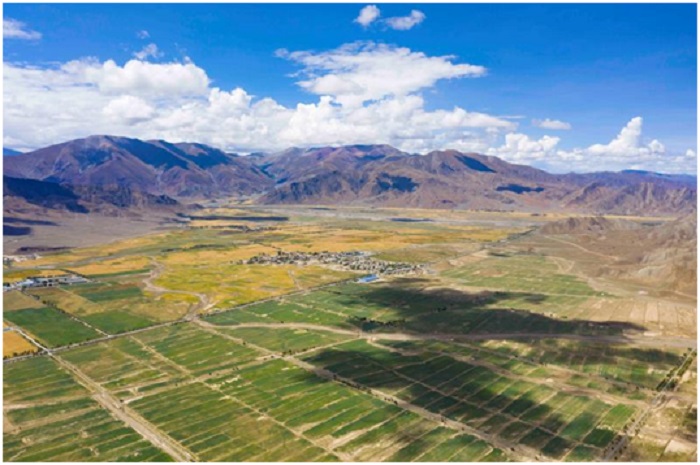



Urgyen Tsering is the head of a collective machinery enterprise established to benefit farmers in Chagjug township, Sagya county, Shigatse, China’s Tibet autonomous region. As autumn approaches, he is getting busier day by day.
According to him, he’s currently preparing for the autumn harvest of highland barleys, and a rapeseed oil plant is about to be put into operation soon. Besides, he’s also kept busy by the phone calls from across the country ordering pastures.
The young man, born in the 1990s, has been running his own business in the highland barley fields for seven or eight years.
Sagya is a major agricultural county in Shigatse. It has planted 75,000 mu (5,000 hectares) of highland barleys this year. “We can harvest and pack 1,800 mu of the crops a day with 18 tractors. That’s the efficiency of mechanization,” he told People’s Daily.
“We have 9 large harvesters, 1 excavator, 1 loading machine, 19 large tractors and various other machineries,” he said, adding that his company is the largest agricultural-machinery cooperation organization in the county.
Urgyen Tsering is smart and diligent. He came to Lhasa, capital of Tibet autonomous region a dozen years ago. When he worked for others to operate excavators in 2011 in the city, he joined free tractor, excavator and harvester training sessions organized by Lhasa government. A year later, he contracted a 38.2-kilometer dredging project in Chagjug township, and all the work was completed by himself alone.
In 2015, Urgyen Tsering started the collective machinery enterprise, and applied for a 3-million-yuan ($441,767) loan under the policy support of the local government, which enabled him to fully mechanize his business, from ploughing and planting to harvesting.
“I was even thinking how to handle my business in my dreams,” Urgyen Tsering told People’s Daily. thanks to the favorable policy of the country to develop plateau agriculture, as well as the credibility he has gained in past operation, his enterprise earned 1.5 million yuan in 2018, and 2 million yuan in 2019.
Gyixong village of Chagjug township is home to 81 households, all of whom were impoverished. The village has over 800 mu of farmland, but the yield was not satisfying. Urgyen Tsering signed an agreement with the villagers to offer free farming services, so that the latter can go out for work.
According to the young man, all the residents in the village has shaken off poverty and even bought cars. In April last year, he received a silk banner as an award from the village committee, to mark his contribution to the poverty alleviation efforts of the village.
From 2012 to 2019, the total grain output of Tibet autonomous region increased 10.3 percent from 949,000 tonnes to over 1.04 million tonnes, and the per capita disposable income for rural residents also went up by 1.3 times from 5,697 yuan to 12,951 yuan.
“Farming and animal husbandry are no longer just businesses to make a living, but a great cause that we love as new-type professional farmers,” said Urgyen Tsering, adding it’s his biggest dream to make his fellows rich by developing modern agriculture and making the business mechanized, extensive, professional and market-oriented.


The Humanitarian Service Diamond Awards has.
A Chinese Company, Inner Galaxy Steel.


The Programme Coordinator, Regulatory, Compliance and.


A Non-Governmental Organization (NGO), Committee for.
The Trustfund Pensions Limited has chided.


The House of Representatives Committee on.
The China General Chamber of Commerce.


Senator Chuka Utazi who represented Enugu.


An Abuja based Legal Practitioner, Ugochukwu.


The African business community in Yiwu,.
Leave a Comment